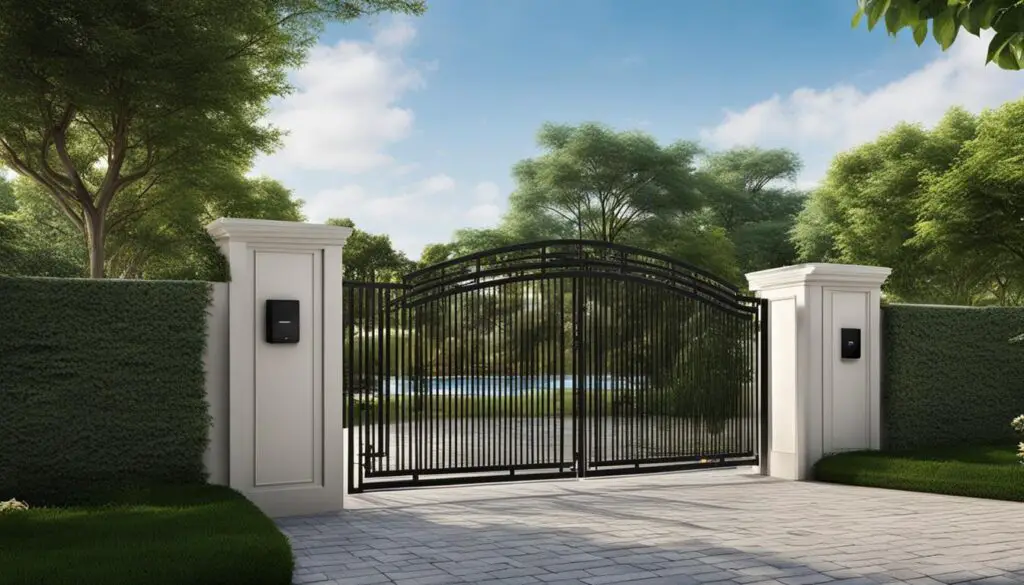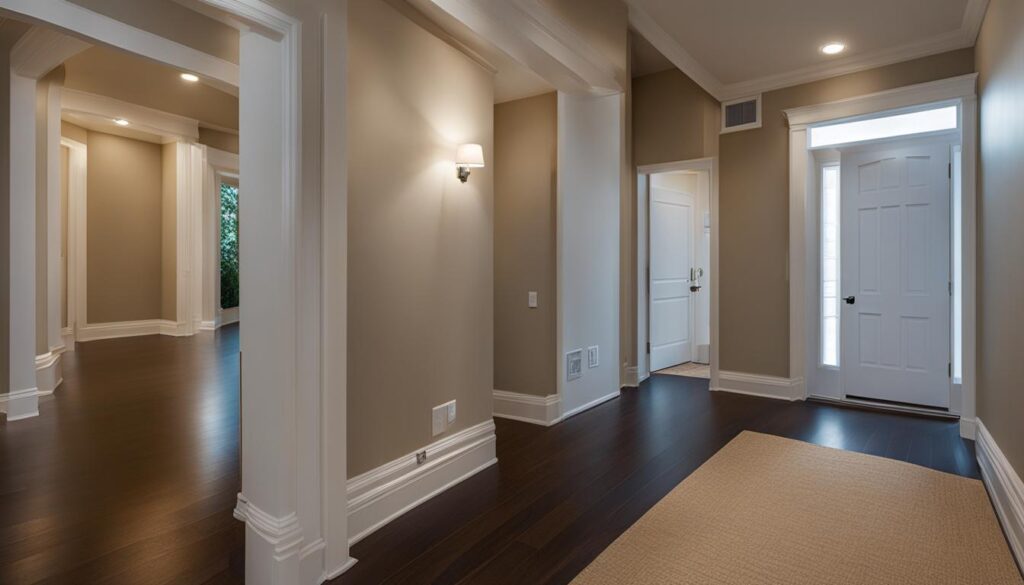The home security industry is constantly evolving to keep up with the ever-changing threats faced by homeowners. With the rise of smart home technologies, there has been a shift towards home security automation. This trend is driven by the desire for enhanced safety and convenience. Homeowners are looking for smart solutions that offer seamless integration with their existing home automation systems. In this section, we will explore the latest trends in home security automation and how they are reshaping the way we protect our homes.
Table of Contents
Key Takeaways:
- Home security automation is a growing trend in the industry.
- Smart home technologies are driving the shift towards automation.
- Seamless integration with existing home automation systems is a key requirement for homeowners.
- Enhanced safety and convenience are the main motivations behind adopting home security automation.
- The latest trends in home security automation are reshaping the way we protect our homes.
Smarter Security Sensors
One of the key trends in home security automation is the development of smarter security sensors. These sensors play a crucial role in identifying areas of a home that may have been compromised. They are equipped with advanced features such as motion detection and the ability to differentiate between humans and animals. This allows homeowners to monitor their homes more effectively and receive instant alerts in the event of any suspicious activity.
With smarter security sensors, homeowners can stay one step ahead of potential threats and take necessary action to protect their homes and loved ones.
These smart sensors can be seamlessly integrated with other security devices, such as cameras and smart locks, to create a comprehensive security system. This integration enables real-time monitoring and provides homeowners with a complete view of their home’s security status.
By leveraging the power of cutting-edge home security technology, these sensors not only detect and deter potential intruders but also provide valuable insights about the daily activities within the home. Homeowners can use this data to optimize their security strategies and enhance the overall safety of their homes.
Furthermore, the integration of smart sensors with home automation systems allows for a seamless control and management of various security features. Homeowners can conveniently arm or disarm their security systems, adjust sensitivity levels of the sensors, and receive notifications directly on their smartphones or other connected devices.
The advancements in security sensor technology have transformed the way we protect our homes, offering peace of mind and reassurance that our loved ones are safe. With their enhanced capabilities, smart sensors are a cornerstone of modern home security automation.
Take a look at the image below to see how smart sensors are installed in a typical home security system:
| Benefits of Smarter Security Sensors | Features |
|---|---|
| 1. Enhanced threat detection | Motion detection, differentiation between humans and animals |
| 2. Real-time alerts | Instant notifications in the event of suspicious activity |
| 3. Seamless integration | Can be integrated with cameras and smart locks for a comprehensive security system |
| 4. Valuable insights | Provide data on daily activities for optimization of security strategies |
| 5. Remote control | Can be armed or disarmed, sensitivity levels adjusted, and notifications received on smartphones |
AI and Machine Learning Solutions
Artificial intelligence (AI) and machine learning are transforming the landscape of home security automation. These cutting-edge technologies are enabling the development of advanced security systems that can adapt to the unique needs and preferences of homeowners. By harnessing the power of AI and machine learning, smart security systems can analyze data from various sources, such as cameras and sensors, to detect patterns and identify potential threats.
One of the key advantages of AI-powered security systems is their ability to provide personalized and seamless protection. These intelligent systems can integrate with other smart home devices, such as door locks, surveillance cameras, and motion sensors, to create a comprehensive and interconnected security ecosystem. By leveraging AI and machine learning, homeowners can enjoy the convenience of a smart home while ensuring their safety.

From analyzing user behavior to detecting anomalies, AI and machine learning algorithms continuously learn and adapt to evolving security challenges. They can differentiate between normal and suspicious activities, reducing false alarms and enhancing overall security effectiveness. With AI and machine learning, homeowners can have peace of mind, knowing that their homes are protected by intelligent and adaptive security systems.
The application of AI and machine learning in home security automation is revolutionizing the industry and pushing the boundaries of what smart security systems can achieve. As technology continues to advance, we can expect even more sophisticated and innovative solutions that cater to the evolving needs of homeowners.
Gate Automation Solutions
Gate automation is an emerging trend in home security automation that offers homeowners an effective way to control access to and from their properties. Automated gates provide not only convenience but also an additional layer of security, enhancing the overall safety of a home. With gate automation, homeowners have the ability to remotely grant access to authorized individuals, such as delivery drivers or family members, while keeping unauthorized individuals out.
Integrating gate automation with other security systems, such as alarms and surveillance cameras, creates a comprehensive security solution for a home. By combining the features of gate automation with remote access and integrated security systems, homeowners can have peace of mind knowing their property is protected from potential intruders.
Take a look at the example below, which illustrates how gate automation can be integrated with other security systems:
| Components | Description |
|---|---|
| Automated Gate | A gate that can be opened and closed automatically using remote control or a mobile app. |
| Surveillance Cameras | Cameras strategically placed to monitor the entrance and surrounding areas of the property. |
| Alarms | Security alarms that detect and alert homeowners of any unauthorized entry attempts. |
Benefits of Gate Automation:
- Increased convenience: Homeowners can remotely control gate access from anywhere, providing convenience for authorized visitors and reducing the need for physical keys or access codes.
- Enhanced security: Automated gates serve as a physical barrier and deterrent to potential intruders, making it harder for unauthorized individuals to enter a property.
- Privacy: By controlling gate access, homeowners can maintain their privacy and regulate who enters their property.
- Seamless integration: Gate automation systems can be seamlessly integrated with other security devices, such as surveillance cameras and alarms, creating an interconnected security system.
Gate automation offers homeowners a powerful tool in their home security arsenal. By combining the convenience of remote access with the added layer of security provided by an automated gate, homeowners can enjoy peace of mind knowing their property is well-protected.

Next, we will explore another significant trend in home security automation – voice-controlled systems.
Voice-Controlled Systems
Voice-controlled systems, such as Alexa and Google Home, have gained significant popularity in the home security automation market. These intelligent systems offer seamless integration with various security devices, including smart locks and surveillance cameras, to enhance the control and monitoring of home security.
“Using voice commands, homeowners can effortlessly lock and unlock doors, arm and disarm alarms, and even access live video footage from their security cameras.”
By leveraging the power of voice, homeowners can conveniently manage their security systems without the need for physical interaction, adding an extra layer of convenience to their daily lives. Imagine being able to arm your home security system while cooking dinner or unlock the front door when your hands are full with groceries.
However, it is crucial to ensure the proper security measures are in place when using voice-controlled systems to protect against unauthorized access by hackers. Regularly updating the system’s firmware, using strong and unique passwords, and enabling two-factor authentication are essential steps in safeguarding these smart systems.
Benefits of Voice-Controlled Systems in Home Security Automation
Integrating voice-controlled systems into a home security setup brings several advantages:
- Convenient and Hands-Free Operation: Voice commands eliminate the need for physical interaction with security devices, making it easier and more convenient for homeowners to manage their systems.
- Enhanced Accessibility: Voice control enables individuals with mobility issues to independently manage their home security without relying on physical interfaces.
- Seamless Integration: Voice-controlled systems can seamlessly integrate with other smart home devices, such as thermostats and lighting systems, for a truly connected and automated home experience.
- Quick Response: Voice commands enable homeowners to promptly perform security actions, such as locking doors or viewing live camera feeds, with a simple verbal instruction.
With voice-controlled systems becoming more prevalent, the future of home security automation is undoubtedly heading towards a more intuitive and effortless user experience.
| Advantages | Concerns |
|---|---|
| Convenient and hands-free operation | Potential for unauthorized access by hackers if not properly secured |
| Enhanced accessibility | Privacy concerns related to voice recordings |
| Seamless integration with other smart devices | Dependency on stable internet connection for voice recognition and response |
| Quick response for security actions | Limited availability of voice-controlled systems in certain regions |
Conclusion
In conclusion, the latest trends in home security automation are revolutionizing the way we protect our homes. With advancements in technology, smarter sensors, AI and machine learning solutions, gate automation, and voice-controlled systems have become integral components of integrated security systems. These trends provide homeowners with enhanced security, convenience, and peace of mind.
Connected home security devices, such as smart sensors, can detect motion and identify potential threats while seamlessly integrating with other security devices, like cameras and smart locks. AI-powered systems analyze data to identify patterns and adapt to the homeowner’s lifestyle. Gate automation solutions offer added security, privacy, and control over access to the property, with remote access for authorized personnel.
Voice-controlled systems allow homeowners to effortlessly manage their security systems using voice commands, ensuring easy control of smart locks and surveillance systems. By staying informed about the latest trends and investing in integrated security systems, homeowners can create a comprehensive security network that safeguards their homes in today’s ever-changing security landscape. With increasing affordability and availability, now is the perfect time to implement these technologies and enjoy the benefits they bring.
FAQ
What are the latest trends in home security automation?
The latest trends in home security automation include the development of smarter security sensors, the use of artificial intelligence (AI) and machine learning technologies, the emergence of gate automation solutions, and the popularity of voice-controlled systems.
How do smarter security sensors contribute to home security automation?
Smarter security sensors play a crucial role in identifying areas of a home that may have been compromised. Equipped with features like motion detection and the ability to differentiate between humans and animals, these sensors allow homeowners to monitor their homes more effectively and receive instant alerts in the event of any suspicious activity.
What is the role of AI and machine learning in home security automation?
AI and machine learning technologies are revolutionizing the home security industry. They enable the development of advanced security systems that can learn and adapt to the homeowner’s lifestyle and preferences. With AI-powered security systems, homeowners can have peace of mind knowing that their homes are protected by intelligent and adaptive security measures.
How does gate automation contribute to home security?
Gate automation provides an effective way to control access to and from the property. It offers convenience, privacy, and an additional layer of security. Homeowners can remotely grant access to authorized personnel while keeping unauthorized individuals out. Gate automation can be integrated with other security systems, such as alarms and surveillance cameras, for a comprehensive security solution.
What are voice-controlled systems in home security automation?
Voice-controlled systems, such as Alexa and Google Home, are becoming increasingly popular in the home security automation market. These systems can integrate with various security devices, including smart locks and surveillance cameras, to provide seamless control and monitoring of the home security system. Homeowners can use voice commands to perform security actions and view live video footage.
How do all these trends contribute to connected and integrated home security systems?
The latest trends in home security automation, including smarter sensors, AI and machine learning, gate automation, and voice-controlled systems, contribute to the development of connected and integrated home security systems. These systems offer enhanced security, convenience, and peace of mind for homeowners, ensuring that their homes are well-protected in today’s ever-changing security landscape.


